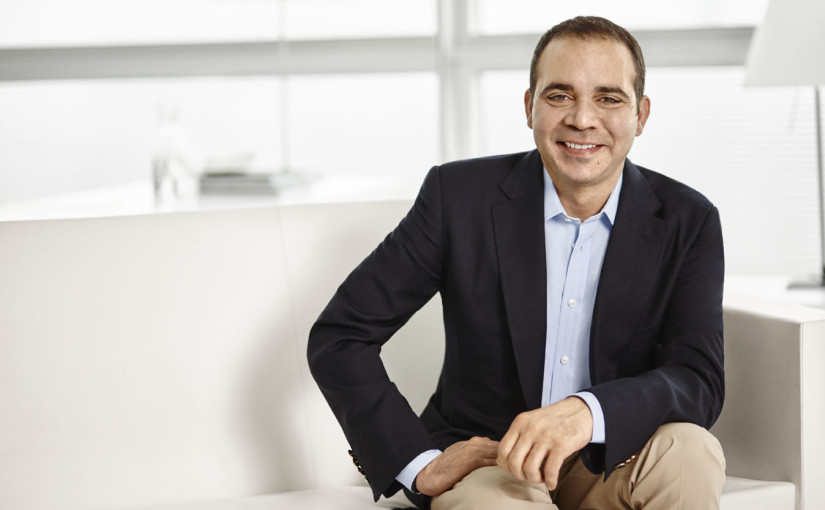By Andrew Warshaw
April 7 – FIFA presidential candidate Prince Ali Bin Al Hussein insists the race for the top job in world football will be a far closer affair than most observers believe as he issued a hard-hitting manifesto in which he all but accused Sepp Blatter of running the organisation far too autonomously.
The Jordanian royal, who formally relinquishes his Asian FIFA vice-presidency in the coming weeks and will quit FIFA for good if he doesn’t win the election on May 29, left no stone unturned as he risked a backlash from Blatter supporters by placing emphasis on greater honesty, transparency and restoring FIFA’s damaged reputation after 17 years under the present regime.
Insisting he was “here to unite people not divide”, and that his manifesto was put together only after “an extensive international consultation process” Prince Ali nevertheless takes Blatter to task on several issues, not least over World Cup revenues being distributed “at the whim of the FIFA president”.
He takes up the same theme when it comes to expanding the World Cup from its current 32 countries and re-allocating places purely for political reasons. The manifesto states such decisions should be taken “openly and democratically” instead of being “the diktat of one individual.”
“I do not believe that the President of FIFA should dictate the nature and shape of the game or the size of the FIFA World Cup,” Prince Ali writes.”
“It is important to acknowledge firstly that any possible changes in the number of participating nations at the FIFA World Cup would be very unlikely to come into effect until after 2022, and secondly that, however you look to expand the World Cup, for every perceived benefit there is also the potential to upset the balance of a tournament that is very competitive and has worked well for many years. I believe that the idea of expanding the FIFA World Cup may have merit, but the decision about the number of new places should not be made arbitrarily in an election year.”
As for FIFA’s development programme, Prince Ali says this too should be organised on a basis that is “transparent, fair, generous and flexible and which delivers support where it is most needed.”
And the same theme of transparency is taken up when it comes to FIFA’s commercial backers who, Prince Ali mantains, are becoming increasingly twitchy.
“The damage which is being exacted upon ‘Brand FIFA’ has financial implications,” says the manifesto. “Sponsors have begun to vote with their feet. If drastic action is not taken urgently to restore the image of our governing body, we can expect revenues to reduce and, in turn, monies available to national associations to also go down.”
But for all the criticism of the past, the two-section manifesto, entitled “A FIFA worthy of the world’s game” and incorporating a 10-point development plan, is not just a breakdown of what Prince Ali perceives needs fixing but which his critics might argue could backfire on him.
It also includes a number of sensible ideas for change.
Top of the list is a return to a formal World Cup rotation system plus the idea of a global coaches exchange programme to help countries most in need of developing the sport on the ground. And the establishment of regional FIFA development offices.
The launch of Prince Ali’s manifesto co-incided with the Confederation of African Football Congress in Cairo, the latest stop on the campaign trail for all the contenders.
“I didn’t want to delay this any longer,” he told Insideforldfootball, stressing that once the politics had been swept away he was delivering a positive message and was particularly keen to focus on areas like coaching scholarships paid for by FIFA.
“There are so many national associations around the world who have problems in this area and, at the same time, so many coaches out of work from developed leagues. Sometimes it’s very difficult for these countries to find the funds. I’ve always wanted to do something like this. Development is not only about projects, it’s also about the human element. It could also work the other way round, sending local coaches to established overseas clubs to gain on-the- ground experience.”
In terms of World Cup slots, Prince Ali was back on the offensive, however.
“It’s not right that what is effectively a new exco should be tasked the day after the election in deciding whether or not to expand the World Cup. These sorts of decisions need to happen before an election or some time after. This way, it lends itself to people making promises they perhaps can’t deliver on. Too many decisions have been taken without being thought out properly.”
But rotation, said Prince Ali, had to return in order to give as many regions as possible the chance to host, with joint hosts from different confederations also possible – provided they are in close proximity.
Under such a rotation system, Prince Ali said, it should definitely be CONCACAF’s turn in 2026. Though CONCACAF have been heard to argue that under the principle of rotation that many felt was still in existence, their turn was in fact in 2022.
Although his manifesto covers FIFA past, present and future, there is still a danger that those opposed to Prince Ali may not even read it.
“I hope that doesn’t happen. I’m pretty sure the national associations will read it thoroughly. People say this (election) is unwinnable. Believe me, it isn’t.”
Prince ali’s manifesto can be read at: www.worldsgame.com.
Contact the writer of this story at moc.l1745055519labto1745055519ofdlr1745055519owedi1745055519sni@w1745055519ahsra1745055519w.wer1745055519dna1745055519

